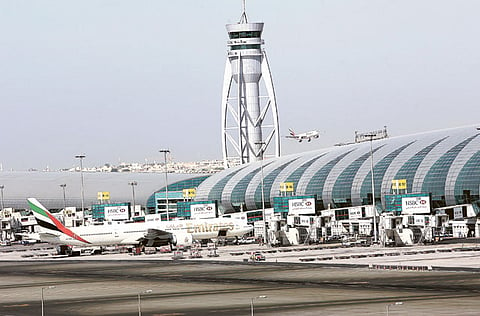Emirates expects more airlines to go under
Carrier to stick to no-hedging strategy as IATA says rising fuel costs will drag industry profits down by 62% this year

Dubai: Emirates said more carriers will go bust this year as fuel costs and sluggish economies undermine profitability.
"We can reel off a whole load of airlines that are teetering on the brink or are really gone," Tim Clark, the carrier's president, said in an interview.
"Roll this forward to Christmas, another eight or nine months, and we're going to see this industry in serious trouble."
Airline profits will plunge 62 per cent in 2012 to $3 billion (Dh11 billion), equal to a 0.5 per cent margin on sales, as oil prices rise, the International Air Transport Association said this week. Emirates's fuel bill accounts for 45 per cent of costs and may jump by an "incredibly challenging" $1.7 billion in the year ending March 31, according to Clark, who says he's sticking with a no-hedging strategy rather than risking a losing bet.
"You think you're going to win, but in the long term you always lose," Clark said yesterday.
"When we enter into derivatives, betting whatever it may be with counterparties who actually control the price of fuel in the first place, you have to ask yourself, ‘Is that smart?'"
AMR Corp's American Airlines is restructuring after filing for Chapter 11 bankruptcy and India's Kingfisher Airlines Ltd may lose its licence as it struggles with cash shortages and losses. That's after Barcelona-based Spanair collapsed on January 27, followed that week by Hungarian national carrier Malev.
Clark said some private airlines will need to be bailed out by governments in the countries where they're based, though that will raise aid issues with the European Union and other parties.
In the United States, more filings for Chapter 11 protection are likely, while smaller carriers operating in the Indian Ocean region and in Africa face "difficulties," the executive said.
"This is what the fuel prices are doing," he said.
"It's about time somebody sitting there, controlling the fuel prices, began to look a little bit more seriously at the devastation it's causing, not only to airlines but to the global economy."
The industry couldn't survive a further 10 or 15 per cent increase in fuel prices, especially with the European Union's carbon emissions trading system about to add to costs, he said.
Bottom line ‘zapped'
At Emirates the fuel bill, while not over budget, has "zapped the bottom line," and that will be evident in annual results scheduled to be published next month, Clark said.
Earnings at Emirates are also being hurt by the continued grounding of Airbus A380 superjumbos, of which it's the No 1 operator, after the discovery of wing cracks. Six of the jets, which generate $50,000 an hour 15 hours a day, are out of action for repairs, idling 830 cabin crew and 160 pilots, and the carrier is having to compensate people set on an A380 trip.
"That's had a poleaxing effect in the last nearly three months," Clark said, estimating the revenue loss so far at $90 million.
"Those airplanes are always full, they're always popular. We've had multiple cancellations. We've had people telling us ‘Well you sold me the A380', so we had to throw in 5,000 or 10,000 miles or give money back. It's a mess."
Emirates operates 21 A380s, with 69 more on order.



